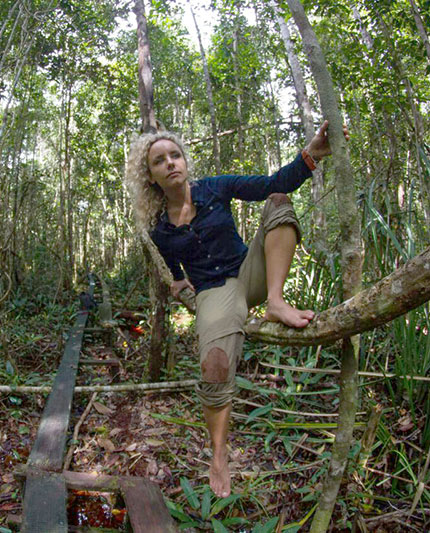Dr. Julia Mörchen

Position: Associated guest scientist
Research Group "Primate Behavioural Ecology"
Max Planck Institute for Evolutionary Anthropology
Department of Primate Behavior and Evolution
Deutscher Platz 6
D-04103 Leipzig Germany
and
University of Leipzig Faculty of Life Science
Institute of Biology
Behavioral Ecology Research Group
Talstrasse 33
D-04103 Leipzig Germany
e-mail: julia.moerchen@[>>> Please remove the text! <<<]uni-leipzig.de
Research interests
My research centers on understanding the impact of migration on cultural evolution. I explore how migrant and local individuals adapt behaviourally to migration outcomes, using different great apes, including humans, as study species. By investigating the social learning behaviours and cultural repertoires of non-related, adult great apes, I aim to correlate social integration and social transmission of cultural knowledge with measures of ecological and social competence, ultimately affecting reproductive success and survival.
Curriculum Vitae
Current Position
Since 11/2024 | Associated Guest Scientist, Max Planck Institute for Evolutionary Anthropology, Leipzig, University of Leipzig, Max Planck Institute of Animal Behavior |
| Since 09/2024 | Biologist, Agency for the Environment, Climate, Energy and Agriculture, Higher Nature Conservation Authority of the City of Hamburg, Germany |
Education
| 01/2019 – 12/2024 | Dr. rer. nat. Biology. Max Planck Institute for Evolutionary Anthropology, Leipzig, University of Leipzig, Max Planck Institute of Animal Behavior, Konstanz. Supervised by: Prof. Anja Widdig & Dr. Caroline Schuppli. Doctoral thesis: “Social learning and cultural transmission in the context of migration: Insights from two orangutan populations”. Grade: Magna cum laude (Very good) |
| 10/2013-10/2016 | Master of Science in Biology, University of Hamburg, Germany, Supervised by: Prof. Carel van Schaik & Prof. Jutta Schneider, Final grade: excellent (GPA 1.19) Master Thesis: “Learning from the immigrants: dispersing orangutan males as cultural vectors” |
| 10/2014-03/2015 | Erasmus Mobility Student, University of Zurich, Switzerland |
| 10/2010-10/2013 | Bachelor of Science in Biology, University of Hamburg, Supervised by: Prof. Julia Fischer & Prof. Jutta Schneider, Final grade: excellent (GPA 1.25) Bachelor Thesis: “Effects of Ageing in social interest in Barbary macaques (Macaca sylvanus) - testing predictions from socio-emotional selectivity theory” |
| 10/2008 – 09/2010 | Research student & Veterinary assistant, Zoo Palmitos Park, Canary Island, Study abroad Programme of Free University Berlin, during Bachelor Biology studies |
| 09/2006 - 07/2008 | Matura, Friedrich- von- Spee School, Paderborn, Germany, Final grade: excellent (GPA 1.5) |
Praxis
| 01/2019 – 04/2021 | Project leader, SORAYA Orangutan project (www.suaq.org) |
| 04/2017 - 12/2017 08/2018 - 12/2018 02/2014 - 12/2014 | Freelance Biologist, Agency for Environment and Energy of the City of Hamburg, Department of Conservation |
| 07/2017 | Freelance Biologist, “Hadabuan Hills” Expedition, North Sumatra, Indonesia |
| 11/2017-12/2017 | Scientific advisor GEO Magazine, for a reportage on Culture in Sumatran Orangutans, Indonesia |
| 12/2017 | Freelance Biologist, NGO “Lebensraum Regenwald e.V.” in collaboration with BOSF (Bornean Orangutan Survival Foundation) |
| 08/2011 – 09/2012 | Research Assistant, Zoological Institute & Museum, University of Hamburg |
| 02/2012 – 03/2012 | Volunteer Research student, “Living Links to Human Evolution” Research Center, Edinburgh Zoo, University of St. Andrews, School of Psychology, United Kingdom |
| 04/2011 – 08/2011 | Research assistant, Bio Center Klein Flottbek, University of Hamburg, Germany, Course “Biodiversity of plants”, Supervised: Dr. Barbara Rudolph |
| 05/2010 – 09/2010 | News Researcher, NDR, Hamburg Germany |
| 10/2009 – 04/2010 | Research student & Veterinary assistant, Zoo Palmitos Park, Canary Island, Study abroad Programme of Free University Berlin |
STUDENTS & TEACHING
| 12/2020 – 05/2022 | Supervision: M.Sc. Thesis, Natascha Riedel, “Measuring ecological competence in immigrant male orangutans”, University of Leipzig |
| 09/2019 – 11/2021 | Supervision: M.Sc. Thesis, Frances Luhn, “Peering behaviour in dispersing orangutan males on Sumatra and Borneo”, University of Leipzig |
| 06/2019 – 03/2021 | Co-Supervision: M.Sc. Thesis, Jacinthe Grima, “Description of a newly observed food-associated sound in a wild Sumatran orangutan population (Pongo abelii): a cultural innovation?”, Stockholm University |
| 08/2022 08/2023 | Organization and Supervision of “Primate Conservation”, Modul BIO-11-207, University Leipzig |
| 12/2022 – 01/2023 12/2021 – 01/2022 12/2020 – 01/2021 | Co-Supervision, Practical course “Primate Behavioural Ecology”, Modul BIO-11-212, University Leipzig |
| 01/2023 – 02/2023 01/2022 – 02/2022 | Co-Supervision, Day 14 “Verhaltensökologie” Modul 11-BIO-0101, University Leipzig |
Publications
Mörchen, J. (2024). Social learning and cultural transmission in the context of migration: insights from two orangutan populations. PhD Thesis, Universität Leipzig, Leipzig. |
|
Mörchen, J., Luhn, F., Wassmer, O., Kunz, J. A., Kulik, L., van Noordwijk, M., Rianti, P., Rahmaeti, T., Atmoko, S. S. U., Widdig, A. ǂ., & Schuppli, C. (2024). Orangutan males make increased use of social learning opportunities, when resource availability is high. iScience, 27(2): 108940. |
Mörchen, J., Luhn, F., Wassmer, O., Kunz, J., Kulik, L., van Noordwijk, M., van Schaik, C., Rianti, P., Atmoko, S. S. U., Widdig, A. ǂ., & Schuppli, C. ǂ. (2023). Migrant orangutan males use social learning to adapt to new habitat after dispersal. Frontiers Ecology And Evolution, 11. |
Ehmann, B., van Schaik, C. P., Ashbury, A. M., Mörchen, J., Musdarlia, H., Utami Atmoko, S., van Noordwijk, M. A., & Schuppli, C. (2021). Immature wild orangutans acquire relevant ecological knowledge through sex-specific attentional biases during social learning. PLoS Biology, 19: e3001173. |
Gruber, T., Luncz, L. V., Mörchen, J., Schuppli, C., Kendal, R. L., & Hockings, K. (2019). Cultural change in animals: A flexible behavioural adaptation to human disturbance. Palgrave Communications, 5: 9. |
Meeting Abstracts
Mörchen, J., van Noordwijk, M.A. & van Schaik, C.P. (2017). “Learning from the immigrants: dispersing orangutan males as cultural vectors”, EFP conference, University of Strasbourg, France, Invited culture symposium talk.
Mörchen, J., van Noordwijk, M.A. & van Schaik, C.P. (2017). “Learning from the immigrants: dispersing orangutan males as cultural vectors”, GFP conference, University of Zurich, Switzerland.
Brandão, S.N. & Mörchen, J. (2012). “Small animals for understanding big biodiversity questions - A morphometric study for species concept within Southern Ocean Ostracods”, From Knowledge to Action Conference, International Polar Year, Montreal, Canada.
 Open Access
Open Access